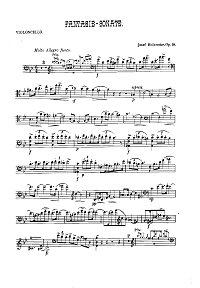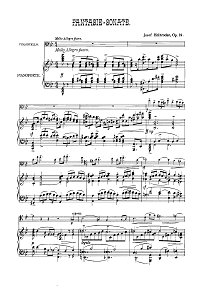Holbrooke - Sonata-fantasy for cello and piano op.19
Holbrooke - Sonata-fantasy for cello and piano. You can download the sheet music Holbrooke - Sonata-fantasy for cello and piano on this page. This unique cello creative is the grand masterpiece of music for string instrument by the well-known composer. This composition delight everybody by the engrossing dialog between melody of two instruments and traditional musical characteristics.
To view the first page of Holbrooke - Sonata-fantasy for cello and piano click the music sheet image.
|
| PDF format sheet music |
|
|
|
Cello part: 5 pages. 208 K
|
Piano part: 22 pages. 853 K
|
 |
 |
|
|
| Download PDF (14.99
€) |
Download PDF (14.99
€) |
| Joseph Charles Holbrooke (1878 – 1958) was an English composer, conductor, and pianist. Holbrooke was fascinated by the writings of Edgar Allan Poe which deal with the supernatural and the macabre, eventually producing over thirty compositions which he referred to as his "Poeana". These included orchestral works, a double concerto for clarinet and bassoon, choral works (a choral symphony Homage to E.A. Poe and a poem for chorus and orchestra The Bells), a ballet, a multitude of chamber works and several piano pieces.
He produced several foxtrots and valses for dance orchestra and, perhaps uniquely amongst prominent British composers, also composed and compiled suites of pieces for theatre orchestras to accompany silent films. He was also notably productive in writing original works for both brass band and military band.
Throughout his career he continually revised his compositions: titles were changed with an almost casual regularity, many works were assigned several different opus numbers at different times, he borrowed music from one piece to another and recast works in different forms: for example, The Pit and the Pendulum draws its material from the opera-ballet The Enchanter, Symphony No.7 is a transcription for string orchestra of a String Sextet, The Masque of the Red Death which was originally another orchestral poem became a ballet, and what was illustrative of Henry Wadsworth Longfellow's The Skeleton in Armour was seemingly also a close depiction of Byron's The Corsair, whilst several different versions of his orchestral variations on Auld Lang Syne exist with a number of the supposed 'musical portraits' apparently applicable simultaneously to different contemporaries. |
|